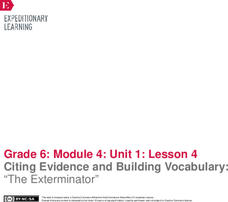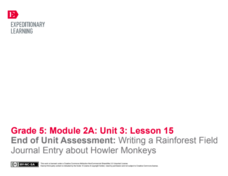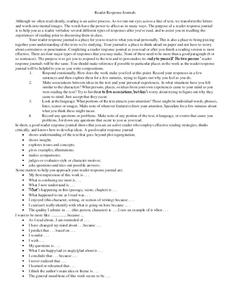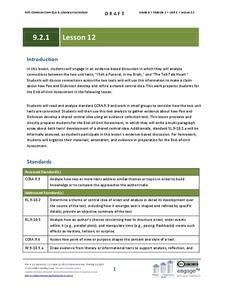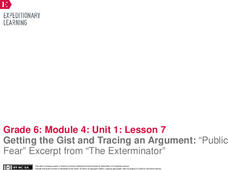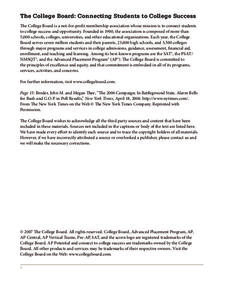EngageNY
Citing Evidence and Building Vocabulary: “The Exterminator”
It is an out-of-body experience. Scholars take a look at the sidebars outside the body of the text in The Exterminator. They discuss the purpose of this type of text feature and work to determine the gist. Learners write unfamiliar...
EngageNY
End of Unit Assessment: Writing a Rainforest Field Journal Entry about Howler Monkeys
Give me more details. Scholars complete an end of unit assessment by creating an information text box to go with their field journal entries about howler monkeys. Learners use the class time to work independently.
Unified School District of De Pere
Reader Response Journals
Writing about and in response to what you read can help you process the text and lead to stronger analysis. Included here are four larger topics that students can write about, sentence starters to help pupils get started with their...
Fluence Learning
Writing an Argument: The NIEHS
Should the work of the National Institute of Environmental Health Sciences be funded by the government? Middle schoolers weigh in on the status of federal funding for programs that protect the environment with three text passages and...
Curated OER
Knowledge or Instinct? Jack London's "To Build a Fire"
Students closely read " To Build a Fire," to explore the use of narrative point of view and debate the distinction between knowledge and instinct. The elements of literary naturalism and how they relate to Jack London's work is examined...
Hawaiʻi State Department of Education
Sequence of Events
Are you in need of a new way to teach learners sequence of events and how to interpret a character's external motivations? Why not engage them in dramatic play? The class will use tableaux to convey the sequence of events in a familiar...
Warren County Public Schools
Small Group Discussion Questions
Support a class reading of the novel Song of the Trees by Mildred D. Taylor with this series of discussion questions. Covering a variety of topics from character and setting to historical accuracy and symbolism, these questions challenge...
Humanities Texas
Primary Source Worksheet: Excerpt from Reagan's Speech to the National Association of Evangelicals
Ronald Reagan's 1983 speech to the National Association of Evangelicals (also know as the "Evil Empire Speech") offers readers with an opportunity to practice their skills at reading informational text, specifically primary source...
EngageNY
Grade 9 ELA Module 2: Unit 1, Lesson 3
Hearken! and observe how well a literary analysis unit can help ninth graders read closely and connect text structure to a central idea. Focusing on Edgar Allan Poe's "The Tell-Tale Heart," learners take notes and track the development...
EngageNY
Grade 9 ELA Module 2: Unit 1, Lesson 12
What happens when a tenuous grasp on sanity begins to slip? Compare Edgar Allan Poe's "The Tell-Tale Heart" and Emily Dickinson's "I Felt a Funeral, in my Brain" with a lesson plan focused on developing a common central idea. High...
Fluence Learning
Writing an Opinion: Student Council
A three-part assessment challenges scholars to write opinion essays covering the topic of the student council. After reading three passages, writers complete a chart, work with peers to complete a mini-research project, answer...
National Woman's History Museum
Defying British Rule: Women's Contributions to The American Revolution
Primary and secondary sources are the focus of a lesson that showcases the important role women played during the American Revolution. Pairs review sources and discuss their findings. A close-reading of an informational text leads the...
EngageNY
Building Background Knowledge: The Lost Boys of Sudan
Get deep! Teach scholars how to make connections between texts to deepen their understanding of a topic. Using the resource, pupils read and annotate a short informational text about Sudan's Civil War and refugee crisis. Next, they...
EngageNY
Analyzing Character: Launching Pygmalion, Part 2
Readers of Pygmalion use Eliza Character Tracker Parts one and two to notice and wonder about character analysis. They read text excerpts and mark details that show how Eliza feels and why she acts in certain ways. To finish, they answer...
EngageNY
Getting the Gist and Tracing an Argument: “Public Fear” Excerpt from “The Exterminator”
Only fear fear itself. Scholars read Public Fear from The Exterminator. Triads work together to annotate and determine the gist of the text. They then complete a Tracing an Argument graphic organizer to identify arguments, claims, and...
DocsTeach
The Civil Rights Act of 1964 and the Equal Employment Opportunity Commission
1964: A victory for the civil rights movement! Scholars read a section of the Civil Rights Act of 1964 and discuss what affirmative actions means to them. The resource is a jigsaw activity, with each group focusing on one section of the...
EngageNY
Analyzing Images and Language: Inferring about the Natural Disaster in Eight Days
Pictures often reveal different meanings. Scholars analyze the images in Eight Days and discuss how they add meaning to the text. Readers answers questions about how specific colors are used to create different emotions. Learners then...
Learning for Justice
The Color of Law: Winners and Losers in the Job Market
The second lesson in "The Color of Law" shows how government policies supported economic inequality. Scholars read additional excerpts and respond to text-dependent questions from "The Color of Law" text, examine primary source documents...
PBS
Amid Rising Economic Inequality, Does America Need a Third Reconstruction?
Young political scientists investigate the Poor People's Campaign protest held in Washington, D.C., on June 18, 2022. They research how the event was reported in various news outlets and consider their stance on whether "poverty is...
Curated OER
Discussion Questions for Shakespeare's Julius Caeser
Do not let Julius Caesar be Greek to your pupils. Rather, make the play a dish fit for hungry minds. Encourage your class members to lend their ears to a series of rich discussion questions so that they can become masters of the play, as...
Curated OER
Applying KWL Guides to Sources with Elementary Students
What is a KWL chart? Here is a well thought-out lesson that has learners use KWL charts to gain historical perspective. Your class examines primary sources about historical events and identifies what they know, want to know, and,...
ReadWriteThink
Beyond the Story: A Dickens of a Party
It's time to party like it's 1899! Incorporate a research-based celebration of the Victorian Era into your unit on A Christmas Carol by Charles Dickens. After learners read the novella or view a production of the play, they craft a...
College Board
Sampling Distributions
The validity of data depends on the strength of the sample. A collection of instruction and activities focuses on sampling distributions and the analysis of that data. Scholars learn about distribution tests such and Central Limit...
Curated OER
Identifying Personification in Poetry
Improve your young poets' descriptive writing with this lesson on personification. A SMART board and PowerPoint presentation guide your class through the process of identifying human qualities attributed to various non-human objects. A...


